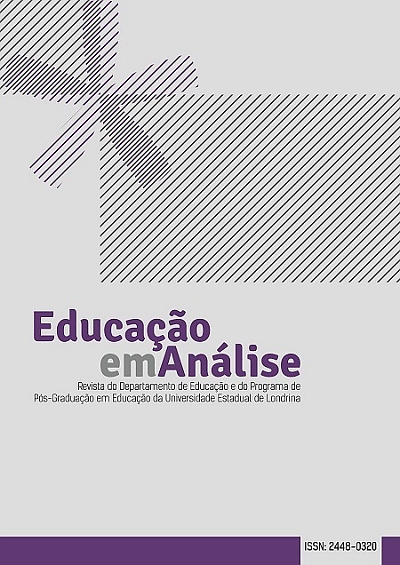Education and human rights: specificities of ethnic-racial relations in Brazil
DOI:
https://doi.org/10.5433/1984-7939.2017v2n2p231Keywords:
Education, Human rights, Race relations.Abstract
This paper addresses the presences and absences of socially relevant themes related to human rights, within the legal frameworks that prescribe what should be taught in Basic Education in Brazil. It highlights the context of the legal obligation to teach African, Afro-Brazilian and indigenous history and culture, related to the Education of Ethnic-Racial Relations (ERER), as a framework for affirmative action and anti-racism policies in Brazil, in the field of Education. ERER is analyzed as a social demand, notably built by the Black Movement, a project of racial equity for Brazilian society and State policy instituted since 2003, through article 26-A of the National Education Guidelines and Bases Law. The legal prescriptions, instituted by public agreements linked to the contemporary processes of historical reparation, are crossed by the present-day clashes and project socially controversial themes to the curriculum. The text presents research results that interrogate racism in school education, as an example of controversial subject, analyzing pedagogical practices experienced by managers and teachers of a municipal network in the metropolitan region of Porto Alegre, Rio Grande do Sul. The conceptual definition of ERER is officially made explicit from the Opinion of the National Council of Education / Full Council (CNE/CP) 03/2004, here dealt with at the intersection with Education for Human Rights and the specificities of race relations in Brazil.Downloads
References
BRASIL. Ministério da Educação. Comitê Nacional de Educação em Direitos Humanos. Plano Nacional de Educação em Direitos Humanos. Brasília: UNESCO, 2007.
BRASIL. Ministério da Educação. Plano Nacional de Implementação das Diretrizes Curriculares Nacionais para a Educação das Relações Étnico-Raciais e para o Ensino de História e Cultura Afro-Brasileira. Brasília, 2003.
BRASIL. Ministério da Educação. Lei n. 10.639 de 9 de janeiro de 2003. Altera a Lei no 9.394, de 20 de dezembro de 1996, que estabelece as diretrizes e bases da educação nacional, para incluir no currículo oficial da Rede de Ensino a obrigatoriedade da temática “História e Cultura Afro-Brasileira”, e dá outras providências. Diário Oficial da União, Brasília, DF, 10 jan. 2003. p. 1.
BRASIL. Ministério da Educação. Lei n. 11.645 de 10 de março de 2008. Altera a Lei 9.394, de 20 de dezembro de 1996, modificada pela Lei 10.639, de 9 de janeiro de 2003, que estabelece as diretrizes e bases da educação nacional, para incluir no currículo oficial da rede de ensino a obrigatoriedade da temática “História e Cultura Afro-Brasileira e Indígena”. Diário Oficial da União, Brasília, DF, 11 mar. 2008. p. 1.
DIAS, Marcelo; PRUDENTE, Wilson. Relatório Parcial da Comissão Estadual da Verdade da Escravidão Negra no Brasil, OAB/RJ. Rio de Janeiro: Mavi, 2016.
FANON, Frantz. Em defesa da revolução africana. Lisboa: Livraria Sá da Costa, 1969.
GONÇALVES, Luiz Alberto Oliveira; SILVA, Petronilha Beatriz Gonçalves e. Movimento Negro e Educação. Revista Brasileira de Educação, Rio de Janeiro, n. 15, p. 134-158, Set/Out/Nov/Dez., 2000.
KARASCH, Mary. A vida dos escravos no Rio de Janeiro. Rio de Janeiro: Companhia das Letras, 2000.
MACEDO, José Rivair. Entendendo a Diáspora Africana no Brasil. In: FERNANDES, Evandro et al (Org.). Da África aos Indígenas no Brasil. Porto Alegre: UFRGS, 2016.
MEINERZ, C.B.; ANTUNES, C.P.; BERGAMASCHI, M.A. Interculturalidade e educação das Relações Étnico-Raciais: reflexões sobre a aplicação da Lei 11.645/08 no Rio Grande do Sul. Periferia, v.7, n.1, p. 90-106, jan-jun., 2015.
MEINERZ, Carla Beatriz. Ensino de História, Diálogo Intercultural e Relações ÉtnicoRaciais. Educação & Realidade, Porto Alegre, v. 42, n. 1, p. 59-77, 2017a.
MEINERZ, Carla Beatriz. Marcos legais para a Educação das Relações Étnico-Raciais (ERER) no Brasil – texto produzido para o Curso Uniafro 2017-2018. Porto Alegre: UNIAFRO/UFRGS, 2017b.
ORGANIZAÇÃO DAS NAÇÕES UNIDAS. Declaração e Programa de Ação. In: CONFERÊNCIA MUNDIAL DE COMBATE AO RACISMO, DISCRIMINAÇÃO RACIAL, XENOFOBIA E INTOLERÂNCIA CORRELATA, 2001, Durban, África do Sul.
PEREIRA, Priscila Nunes. Concepções políticas pedagógicas para o ensino de histórias e culturas africana e afro-brasileira no município de Cachoeirinha. Trabalho de Conclusão de Curso (Graduação em História: Licenciatura) - Instituto de Filosofia e Ciências Humanas, Universidade Federal do Rio Grande do Sul, 2015.
SCHWARCZ, Lília Moritz. Nem Preto nem Branco, Muito pelo Contrário: cor e raça na intimidade. In: SCHWARCZ, Lília Moritz (Org.). História da Vida Privada no Brasil: contrastes da intimidade contemporânea. São Paulo: Cia das Letras, 1998, v. 4.
Downloads
Published
How to Cite
Issue
Section
License
Os artigos publicados na Revista Educação em Análise estão sob a Licença Creative Commons Atribuição 4.0 Internacional, garantindo Acesso Aberto. Deste modo, os autores mantêm os direitos autorais de seus trabalhos e, em caso de republicação, solicita-se que indiquem a primeira publicação nesta revista. Essa licença permite que qualquer pessoa leia, baixe, copie e compartilhe o conteúdo, desde que a devida citação seja feita. Além disso, autoriza a redistribuição, adaptação e criação de obras derivadas em qualquer formato ou meio, incluindo uso comercial, desde que a atribuição à revista seja mantida.
A revista se reserva o direito de efetuar, nos originais, alterações de ordem normativa, ortográfica e gramatical, com vistas a manter o padrão culto da língua e a credibilidade do veículo. Respeitará, no entanto, o estilo de escrever dos autores. Alterações, correções ou sugestões de ordem conceitual serão encaminhadas aos autores, quando necessário.
As opiniões emitidas pelos autores dos artigos são de sua exclusiva responsabilidade.









